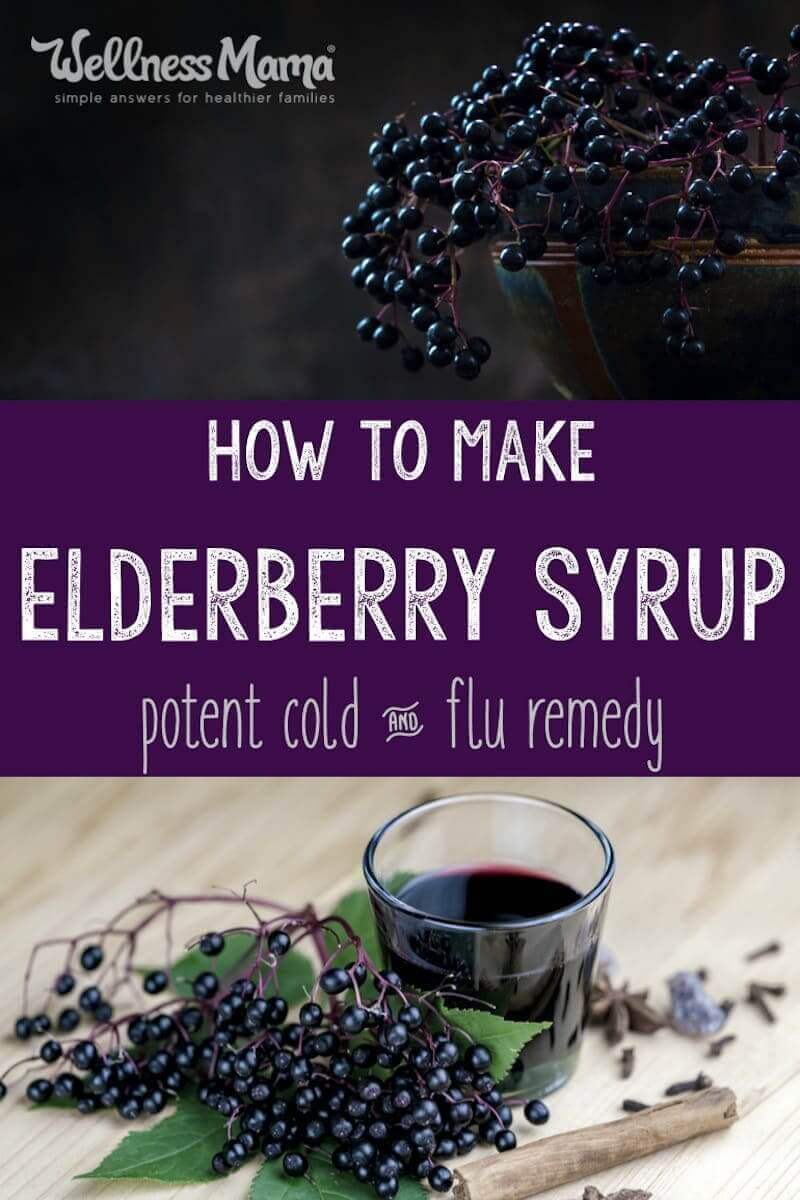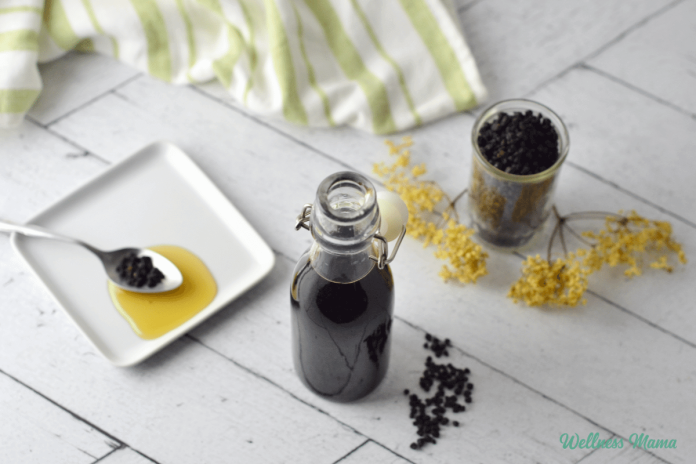Elderberries are one of my most used go-to remedies for cooler months. The dried berries of the Sambucus nigra plant are naturally high in immune-boosting compounds that help with colds and flu. They can be used to make a variety of remedies, and my favorite is this simple elderberry syrup.
Elderberry: A Natural Remedy for Colds and Flu?
There’s certainly a time and a place for conventional medicine and doctor visits. Unfortunately, there isn’t much conventional medicine can do for the common cold or even a mild case of the flu.
If you or your child has ever had a rough case of the common cold or the flu, you know how miserable it can be. Especially for moms. It’s awful to see your children feeling so bad and not be able to fix it. Thankfully, nature provides us with remedies that can help us avoid minor illnesses. And help shorten the duration if we do get them.
Research shows black elderberries (Sambucus nigra) can help us avoid these illnesses. They can even help speed recovery time in those who already have them. I’ve also found elderberries offer some relief from discomfort during minor illnesses.
Benefits of Elderberry
Elderberries naturally have vitamins A, B, and C and stimulate the immune system. Israeli researchers found elderberries pack a punch when it comes to colds and flu. Their complex sugars are clinically shown to help support the immune system. It can cut recovery time in half or better!
Dr. Madeleine Mumcuoglu, of Hadassah-Hebrew University in Israel found that elderberry disarms the enzyme viruses use to penetrate healthy cells in the lining of the nose and throat. Taken before infection, it prevents infection. Taken after infection, it prevents spread of the virus through the respiratory tract. In a clinical trial, 20% of study subjects reported significant improvement within 24 hours, 70% by 48 hours, and 90% claimed complete cure in three days. In contrast, subjects receiving the placebo required 6 days to recover.
Elderberry Syrup: Easy Way to Get the Benefits
Elderberry syrup provides the concentrated immune-supporting benefits of black elderberries. Plus it tastes great! My recipe uses homemade elderberry concentrate with synergistic herbs like cinnamon and ginger. Plus raw honey for an extra immune boost. If you can’t/don’t use honey, see the substitution suggestions below the recipe.
Why Make Your Own?
For one, you’ll save a lot of money!
Several natural elderberry syrups are available at health food stores or online. But usually for around $15 or more for 4-8 ounces. This recipe makes 16 ounces for way less and kids love the taste! You can also fully customize this recipe based on your needs and flavor preferences.
Don’t have any dried elderberries on hand? There are some great pre-made elderberry gummies and elderberry syrup that work just as well. But these supplements do cost more. Also, if you have fresh berries or frozen elderberries on hand, just use double the amount in the recipe.
Making your own elderberry syrup is easy with this recipe!
Elderberry Syrup Recipe
A simple elderberry syrup recipe made with dried elderberries, honey and herbs for an immune boosting and delicious syrup. Can be used medicinally or on homemade pancakes or waffles.
-
Pour the water into a medium saucepan and add the elderberries, ginger, cinnamon, and cloves.
-
Bring to a boil and then uncover and reduce to a simmer for about 30 to 45 minutes until the liquid has reduced by almost half.
-
Remove from heat and let cool until it’s lukewarm.
-
Mash the berries carefully using a spoon or other flat utensil.
-
Pour through a strainer or cheesecloth into a glass jar or bowl. Discard the elderberries.
-
When the liquid is no longer hot, add the cup of honey and stir well.
-
When the honey is well mixed into the elderberry mixture, pour the syrup into a mason jar or glass bottle of some kind.
-
Ta-da! You just made homemade elderberry syrup! Store in the fridge and take daily for its immune boosting properties. Some sources recommend taking only during the week and not on the weekends to boost immunity.
Nutrition Facts
Elderberry Syrup Recipe
Amount Per Serving (1 teaspoon)
Calories 14
% Daily Value*
Fat 0.01g0%
Saturated Fat 0.001g0%
Polyunsaturated Fat 0.004g
Monounsaturated Fat 0.001g
Sodium 1mg0%
Potassium 7mg0%
Carbohydrates 4g1%
Fiber 0.1g0%
Sugar 3g3%
Protein 0.03g0%
Vitamin A 7IU0%
Vitamin C 0.5mg1%
Calcium 1mg0%
Iron 0.04mg0%
* Percent Daily Values are based on a 2000 calorie diet.
Standard dose is ½ – 1 teaspoon for kids and ½ – 1 tablespoon for adults. If the flu does strike, take the normal dose every 2-3 hours instead of once a day until symptoms disappear.
More of a Visual Person?
Here is my one-minute tutorial video for how to make elderberry syrup:
What Does Elderberry Syrup Look/Taste Like?
I’ve found that elderberry on its own tastes a little sour, kind of like grape juice. The honey turns it into a sweet and tasty syrup though. Unlike some store bought versions, or syrups made with sugar, this one is thinner. So don’t be surprised if your elderberry syrup seems more liquid like!
How Long Does Elderberry Syrup Last in the Fridge?
The short answer is it really depends. I’ve found that placing the finished syrup in a mason canning jar while it is still warm creates an air-tight seal. This allows it to last much longer in the fridge, up to several months. As a general rule, it lasts about two weeks in the fridge and I typically freeze whatever I won’t use during that time. You can also freeze some in an ice-cube tray and defrost small amounts when needed.
You can also can the elderberry juice concentrate or the finished syrup. This greatly extends the shelf life.
Can I Harvest My Own Elderberries?
You can, and in fact, you can even grow your own elderberry bush. But it’s important to make sure you’re growing the correct plant. I also recommend working with a local herbalist to find/harvest fresh elderberries. Make sure to only harvest the berries. The stems and leaves are toxic.
Can Elderberry Cause Cytokine Storm?
According to Dr. Elisa Song, a Cytokine Storm is when the immune system overreacts and goes haywire. There is some concern that elderberry might increase the risk of this, especially with certain novel viruses. In short, the evidence right now points to focusing on Vitamin C, Vitamin D levels, sleep and a clean diet. Elderberry’s effects are new and unknown, but I personally think this is a balanced perspective…
From Dr. Song:
“While it’s true that some people have sadly died from influenza and other infections due to a “cytokine storm,” please remember that this is a RARE occurrence and that the media highlights the few and very sad cases of people who die from influenza (some due to cytokine storm, some not), and of course doesn’t highlight the 1000s of people who get influenza every year and do not die, including the many who have zero or very mild symptoms.
While we don’t understand the exact pathophysiology of the cytokine storm, we know it’s NOT just a problem of immune system OVERREACTION, it’s also a problem of immune system UNDERREACTION. The parts of the immune system that create inflammation are in overdrive, and the parts of the immune system that are supposed to REGULATE and bring this inflammation back to equilibrium is not active enough. Remember – INFLAMMATION is NOT always bad.. Inflammation is our body’s normal response to infection and stress. We need inflammation to heal. But inflammation that goes unregulated is the REAL problem. The cytokine storm involves dysregulation between PRO-inflammatory cytokines, ANTI-inflammatory cytokines, and REGULATORY cytokines.
And playing into this is a lack of antioxidants in most of our diets (think colorful fruits and vegetables), Vitamins A, C, E, and glutathione to mop up those free radicals that are produced when we’re sick with any infection. This is similar to what occurs in chronic inflammatory conditions and autoimmune illnesses, but not as dramatically as what has been coined the “cytokine storm.”
Do I think that elderberry can trigger or make a cytokine storm more likely when you have influenza? I really don’t. The centuries of use of elderberry and data on its activity against the influenza virus, its immunoprotective and antioxidant effects leave me with very little concern that its “immunostimulatory effects” will cause your immune system to go haywire. Elderberry has been shown to increase BOTH PRO-inflammatory cytokines and ANTI-inflammatory cytokines, and REDUCE oxidative stress (oxidative stress = free radicals) and may help to REGULATE inflammatory disease like autoimmunity. There have not been case reports of elderberry-induced cytokine storms, and I have not stopped using elderberry for my kids or my patients, even with autoimmune disease. But as with anything, it’s always best to check with your naturopathic or functional medicine doctor!”
One study from 2021 looks at Elderberry’s effect on cytokines. The study authors found no evidence of a link between elderberry and cytokine storms. And there was some evidence elderberry may help reduce inflammation. They also reported on a small study that found elderberry sometimes worked as well as the anti-inflammatory drug diclofenac.
Where is the Best Place to Order Elderberries?
We don’t have a local source, so I’ve always ordered in bulk from an online source. (Order early because they always run out come Fall!) You can get wildcrafted or organic elderberries here. If you would like to purchase a full kit, our friend at Kombucha Kamp has a great one for sale.
What is Elderberry Syrup Used For?
Our family uses it as a preventative remedy by taking 1/2 to 1 teaspoon a day during peak cold and flu season. If we get hit with a minor illness, we double or triple that dose until we feel better. Elderberry is commonly used for immune support and can be used year round as needed for its health benefits.
The unique and complex flavor of elderberries also makes this syrup a great ingredient in certain recipes. I’ve made an elderberry panna cotta by substituting elderberry syrup for the sweetener. It would also make a yummy topping for homemade ice cream.
How Much Elderberry Syrup Should You Take Daily?
This is really a question for an herbalist or natural healthcare provider. Personally, I take 1 teaspoon a day as an adult and give half of this to my kids. During illness, I double or triple this amount.
Ingredient Substitutions
I prefer to use raw, local honey when possible, but raw honey from the store will also work. I also use fresh ginger here, but you could use powdered if that’s what you have (just reduce the amount to 1/2 tsp). And cinnamon sticks and whole cloves could be substituted for the powdered herbs.
Some elderberry recipes add herbs like rosehips, echinacea, star anise, or even lemon juice. There are lots of options, but I’ve found the recipe above to be simple yet effective.
Is There a Substitute For Honey in Elderberry Syrup?
Some people prefer not to use a sweetener. Honey also isn’t recommended for babies under 1-2 years old. Some easy substitutes are:
- Use maple syrup or nutrient-rich molasses in place of the honey.
- Omit the sweetener altogether (this will make elderberry juice which will need to be consumed much more quickly).
- Make an elderberry tincture for adults. Mix the concentrated elderberry syrup with equal parts food-grade alcohol like vodka or brandy instead of sweetener. This obviously wouldn’t be for kids but is a sweetener-free elderberry extract option for adults.
Can I Use Powdered Elderberries?
Yes, I’ve used powdered elderberries when whole elderberries weren’t available. Just use about 1/2 cup in this recipe instead of 2/3 cup.
Can the Elderberries Be Reused?
I don’t recommend reusing them. Ideally, the boiling/mashing process removes much of the nutrients from the berries. Also, there’s some evidence that consuming large amounts of whole berries can be problematic.
This article was medically reviewed by Dr. Scott Soerries, MD, Family Physician, and Medical Director of SteadyMD. As always, this is not personal medical advice and we recommend that you talk with your doctor.
Ever taken elderberry? Will you try this recipe? What natural ways do you use to ward off illness?
- Hawkins, J., Baker, C., Cherry, L., & Dunne, E. (2019). Black elderberry (Sambucus nigra) supplementation effectively treats upper respiratory symptoms: A meta-analysis of randomized, controlled clinical trials. Complementary therapies in medicine, 42, 361–365.
- Wieland, L. S., Piechotta, V., Feinberg, T., Ludeman, E., Hutton, B., Kanji, S., Seely, D., & Garritty, C. (2021). Elderberry for prevention and treatment of viral respiratory illnesses: a systematic review. BMC complementary medicine and therapies, 21(1), 112.





